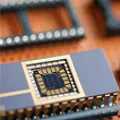TUM Department Electrical and Computer Engineering:
CoC Devices
Center of Competence Electronic, Optoelectronic and Hybrid Devices
MISSION AND GOALS
Development of electronic devices through continuing miniaturization of the structure sizes is accompanied by increasing electric field strengths and emergence of quantization effects.
Alternatively integrated optical and magnetic devices improve the performance of speed, low power consumption, cost reduction in electronic system.
Technological advances achieved in micro- and nanoelectronics can also be used for components in optoelectronics, bioelectronics, power electronics and microsystems.
Basic research, expertise and competencies in semiconductor technology, physical device understanding and modeling, technology related circuit design and methodical design automation are developed for improved or new solutions.
With micro-structured semiconductor devices for power electronics, powerful simulation platforms perform virtual experiments and tests by simulation.
CORE COMPETENCIES
- Development of novel technologies and devices and device models like
- Surface Emitting and Quantum Cascade Laser
- Novel sensors and actors for medical electronics, like e.g. Cellristors: Electronic sensors based on living cells used for environment supervision and food analytics
- Devices and integration techniques for nonvolatile nano-magnetic logic
- Models and circuits for Tunnel Field Effect Transistors (TFETs)
- Devices based on novel materials like carbon nanotubes, nanowires and graphene
- Piezoelectric micro-actuators with novel interdigital electrode structures for micro-fluidics
- Reliability investigations of MOS devices in nanometer technologies
- Robustness and reliability of micro-structured power electronic devices and systems
- Electro-thermal-mechanical modeling of devices for microelectronic, power electronic and mechatronic applications
MEMBERS
Coordinator: Doris Schmitt-Landsiedel, Technical Electronics
Markus-Christian Amann, Semiconductor Technology
Alessio Gagliardi, Simulation of Nanosystems for Energy Conversion
Helmut Gräb, Electronic Design Automation
Christian Jirauschek, Computational Photonics
Franz Kreupl, Hybrid Electronic Systems
Paolo Lugli, Nanoelectronics
Norbert Schwesinger, Micro-Mechatronical Systems
Marc Tornow, Molecular Electronics
Gerhard Wachutka, Technical Electrophysics
Bernhard Wolf, Medical Electronics
RESEARCH
- Optoelectronics, Laser
- Carbon nanotube- and graphene-based novel electronic devices and sensors Nanoelectronic devices
- Processes, devices and circuit blocks for nanomagnetic logic
- Micromechatronic systems for Energy Harvesting, Microsensors, Microfluidics
- Electro-thermo-mechanical functionality and reliability of microelectronic, power electronic and micro-mechatronic devices (MEMS and NEMS)
- Design optimization of hybrid systemsBioelectronic sensors for medical electronics
- Organic electronics
- Simulation of nano-devices and mesoscopic systems
PROJECTS
- NIM Cluster of Excellence
- BMBF-Project Ultra Low Power Electronics with tunneling field effect transistors (for 0.25 Volt) and their use in sensor applications
- Nanomagnetic Logic - DFG-Projects
- Several large national and international projects on biosensors
- Radiation hardness of high breakdown voltage power semiconductor devices
- Optoelectrical characterisation of power semiconductor devices
- Measurement techniques for power semiconductor devices under high temperature operation
www.ei.tum.de/en/research/coc-devices/
https://www.ei.tum.de/en/research/
